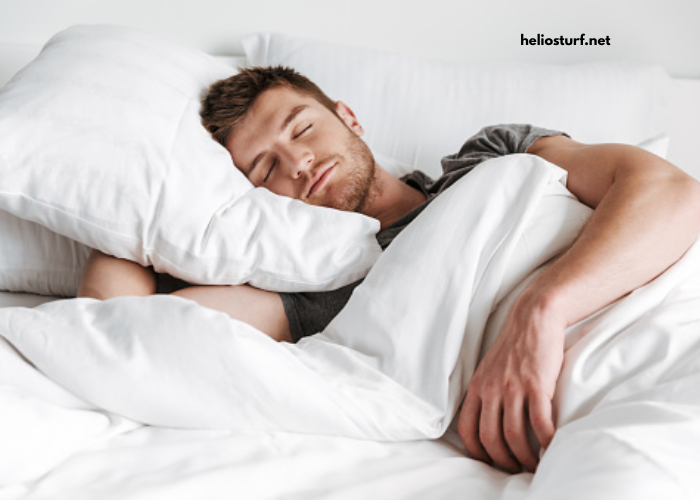
Sleep is not just a necessity—it’s the foundation of a healthy and productive life. With growing stress, screen exposure, and hectic schedules, millions are struggling to get the rest they need. If you’re tired of tossing and turning at night, it’s time to take control of your sleep health. This guide dives deep into proven tips for quality rest—helping you fall asleep faster, stay asleep longer, and wake up truly refreshed.
Why Quality Sleep Matters
The Science Behind Sleep
Sleep is more than a time of rest—it’s when your body and brain undergo crucial repair and recovery. Quality sleep helps with:
-
Strengthening immune function
-
Enhancing memory and cognitive performance
-
Regulating mood and emotions
-
Supporting heart health and metabolism
Consequences of Poor Sleep
Inadequate or disturbed sleep can lead to:
-
Chronic fatigue
-
Weight gain and hormonal imbalance
-
Weakened immunity
-
Increased risk of depression and anxiety
-
Reduced concentration and productivity
In essence, sleep affects nearly every system in the body—making it essential, not optional.
Proven Tips for Better Sleep
Let’s explore practical, science-backed strategies to improve your sleep quality and overall wellbeing.
1. Maintain a Consistent Sleep Schedule
One of the most important tips for better rest is going to bed and waking up at the same time every day—including weekends. Your body follows a natural circadian rhythm, and consistency reinforces it.
Pro tip: Set an alarm for bedtime as well as wake-up time. This trains your body clock and reduces late-night wakefulness.
2. Create a Relaxing Bedtime Routine
Before sleep, signal your body to wind down by engaging in calming activities such as:
-
Reading a physical book
-
Taking a warm bath or shower
-
Practicing deep breathing or meditation
-
Listening to soft, soothing music
Avoid stimulating tasks like checking emails or watching action-packed shows close to bedtime.
3. Optimize Your Sleep Environment
The physical environment where you sleep plays a major role in how restful your sleep is.
Control the Light
-
Use blackout curtains or an eye mask to block external light.
-
Dim lights 30–60 minutes before bed to help your brain produce melatonin.
Adjust Room Temperature
-
Most people sleep best in cool environments, typically between 60°F and 67°F (15–19°C).
Reduce Noise
-
Use earplugs or a white noise machine if your surroundings are noisy.
-
Consider soft fan sounds or sleep-inducing soundtracks to mask disruptive noises.
Invest in a Comfortable Bed
-
Choose a supportive mattress and high-quality pillows suited to your sleeping position.
-
Use breathable, soft bedding to avoid overheating.
4. Limit Exposure to Screens Before Bed
Blue light emitted by phones, tablets, and TVs can suppress melatonin and delay sleep.
What to do:
-
Avoid screens at least 60 minutes before bedtime.
-
Use blue light filters or night mode if screen use is unavoidable.
-
Opt for nighttime reading with paper books or e-readers without backlighting.
Lifestyle Changes That Promote Better Sleep
5. Watch What You Eat and Drink
Avoid Stimulants Late in the Day
-
Caffeine in coffee, tea, chocolate, and soda can disrupt sleep if consumed in the late afternoon or evening.
-
Nicotine, a stimulant, can also interfere with sleep cycles.
Eat Light at Night
Heavy meals, spicy food, or greasy dishes can cause indigestion, keeping you awake. Opt for a light dinner at least 2-3 hours before bedtime.
Limit Alcohol
While alcohol may make you feel sleepy initially, it reduces REM sleep, causes frequent awakenings, and worsens snoring.
6. Stay Active—But Not Right Before Bed
Regular physical activity improves sleep quality and duration. It helps reduce stress and tire your body naturally.
Timing matters:
-
Aim to finish vigorous workouts at least 2–3 hours before bedtime.
-
Gentle yoga or stretching in the evening can support relaxation.
7. Manage Stress and Anxiety
Mental health has a direct impact on your sleep.
Techniques for Mental Calmness
-
Journaling: Write down thoughts or worries before bed to offload mental clutter.
-
Meditation and Mindfulness: Help quiet racing thoughts and ease you into sleep.
-
Cognitive Behavioral Therapy for Insomnia (CBT-I): A proven treatment that addresses negative sleep thoughts and behaviors.
Understand Your Sleep Cycles
Sleep Stages Overview
Sleep occurs in cycles, usually 4–6 per night, each lasting about 90 minutes. The stages include:
-
Stage 1 (Light Sleep): Transition from wakefulness.
-
Stage 2: Heart rate slows, body temperature drops.
-
Stage 3 (Deep Sleep): Crucial for physical recovery and immune function.
-
REM Sleep: Brain activity increases, dreams occur, memory consolidation takes place.
Disruptions that prevent you from reaching deep or REM sleep will leave you feeling tired despite enough hours in bed.
Smart Sleep Tech: Aiding Modern Sleep Challenges
Technology, when used wisely, can help improve sleep rather than harm it.
Sleep Tracking Devices
-
Devices like smartwatches and sleep trackers provide insights into your sleep stages, duration, and patterns.
-
Apps can help you identify what factors may be hurting your sleep.
Smart Lights and Alarms
-
Use smart bulbs that gradually dim to simulate sunset.
-
Wake up with sunrise alarms that mimic natural light to ease your body out of sleep.
Addressing Common Sleep Disorders
If you’ve tried everything and still struggle, it may be time to explore medical issues that affect sleep.
Insomnia
Symptoms:
-
Difficulty falling or staying asleep
-
Waking up too early
-
Non-refreshing sleep
Treatment: CBT-I, lifestyle changes, and occasional use of sleep aids under medical supervision.
Sleep Apnea
Symptoms:
-
Loud snoring
-
Pauses in breathing during sleep
-
Daytime fatigue despite sleeping long hours
Treatment: CPAP machines, weight management, or surgery in severe cases.
Restless Leg Syndrome (RLS)
Symptoms:
-
Uncomfortable leg sensations at night
-
Urge to move legs to relieve discomfort
Treatment: Lifestyle changes, supplements (e.g., iron), or prescribed medication.
If you suspect a sleep disorder, consult a sleep specialist for a proper diagnosis and treatment plan.
Myths About Sleep—Debunked
Myth 1: You Can Catch Up on Sleep Over the Weekend
Fact: Sleep debt can’t be fully recovered. A consistent routine is more beneficial than weekend sleeping marathons.
Myth 2: Alcohol Helps You Sleep Better
Fact: Alcohol can make you fall asleep quickly, but disrupts your sleep cycle and reduces sleep quality.
Myth 3: Everyone Needs 8 Hours
Fact: While 7–9 hours is a general guideline, individual sleep needs can vary based on age, activity level, and genetics.
Tips for Shift Workers and Jet Lag Recovery
Shift Work Survival Tips
-
Stick to the same sleep-wake pattern, even on days off.
-
Use blackout curtains and white noise during daytime sleep.
-
Avoid bright light during your commute home to prevent alertness.
Beating Jet Lag
-
Gradually adjust your sleep schedule before travel.
-
Get sunlight exposure in the destination’s morning hours.
-
Stay hydrated and avoid caffeine or alcohol during long flights.
Natural Supplements That Support Sleep
While not a first-line solution, some people find relief with natural aids:
-
Melatonin: Supports circadian rhythm and sleep onset
-
Magnesium: Helps relax muscles and reduce anxiety
-
Valerian Root: Traditionally used for insomnia
-
Chamomile: Promotes relaxation and may help with sleep quality
Note: Always consult a healthcare provider before starting any supplement.
Final Thoughts: Sleep Is a Lifestyle Choice
Improving your sleep isn’t about a quick fix—it’s about building healthy habits and listening to your body. By implementing consistent routines, creating a sleep-friendly environment, and managing stress, you can transform your rest into something truly rejuvenating.
Remember, better sleep = better life. Start small, be consistent, and the results will follow.
Frequently Asked Questions (FAQs)
How many hours of sleep do adults need?
Most adults need 7 to 9 hours of sleep per night for optimal health and function.
What is the best time to go to bed?
The best time aligns with your body’s natural rhythm. For most people, sleeping between 10 PM and 6 AM supports the body’s hormonal and metabolic cycles.
Is napping good or bad?
Short naps (10–30 minutes) can be beneficial and boost alertness. Avoid long naps in the late afternoon, as they can interfere with nighttime sleep.




